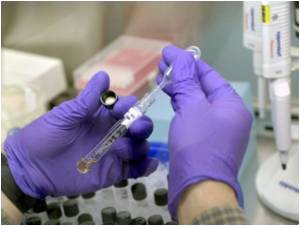The breakthrough could offer an easier way of detecting pathogenic bacteria outside of a clinical setting and could be particularly important for the developing world, where access to more sophisticated laboratory techniques is often limited.

"The neat thing about this is that the functionality of the polymers grown on the surface of the bacteria is programmed by the cells so that they can recognise their own 'kind'. We used fluorescent labels to light up the polymers and were able to capture this labelling using a mobile phone camera, so in principle it could be possible to use these materials as point-of-care diagnostics for pathogenic bacteria."
The study has shown that the bacteria helped to synthesise polymers on their own surfaces which not only were different from those made by conventional methods, but which retained a form of 'structural memory' of that surface. This means in future it should be possible to make specific detection agents or additives for topical anti-infectives that target a number of harmful bacteria all by a common route.
"The initial focus of the research was to explore ways to use synthetic polymers to selectively target and bind the bacteria that cause dental cavities and periodontal diseases in order to facilitate their removal from the oral cavity," said Dr David Churchley, Principal Scientist, Oral Health Category Research and Development, GSK Consumer Healthcare. "As we continued our work, we saw that our research had broader implications and potential for a wider range of uses."
Rapidly identifying harmful bacteria at the heart of a serious medical or dental condition can be a difficult and costly task. The group's findings may even lead to new ways of treating bacterial infections. "These types of polymers may be designed to contain antibacterial functionalities so that they specifically bind to and kill bacterial pathogens," said Dr Klaus Winzer, a microbiologist at The University of Nottingham involved in the study. The selective binding of specific bacterial species and/or strains in current practice requires expensive 'cold-chain' reagents such as antibodies which often preclude using these processes outside of a hospital setting or in developing nations.
The new approach, termed 'bacterial-instructed synthesis', has the potential for use in the developing world, in the field or in less specialised laboratory settings.
Source-Eurekalert
 MEDINDIA
MEDINDIA



 Email
Email




